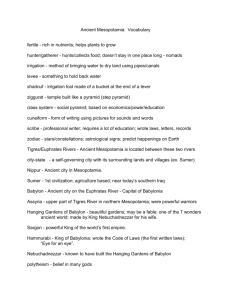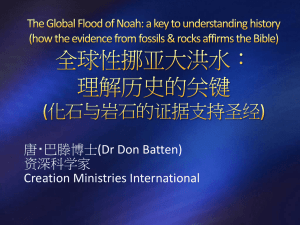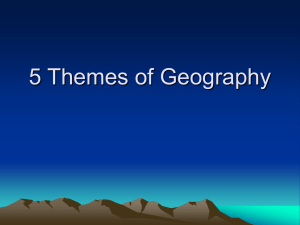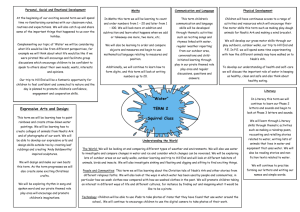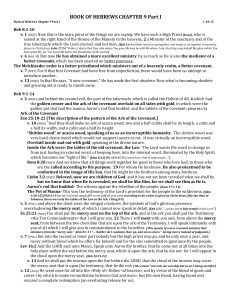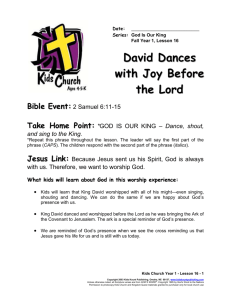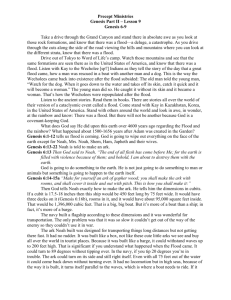ď - First Congregational Church United Church of Christ of St. Clair
advertisement
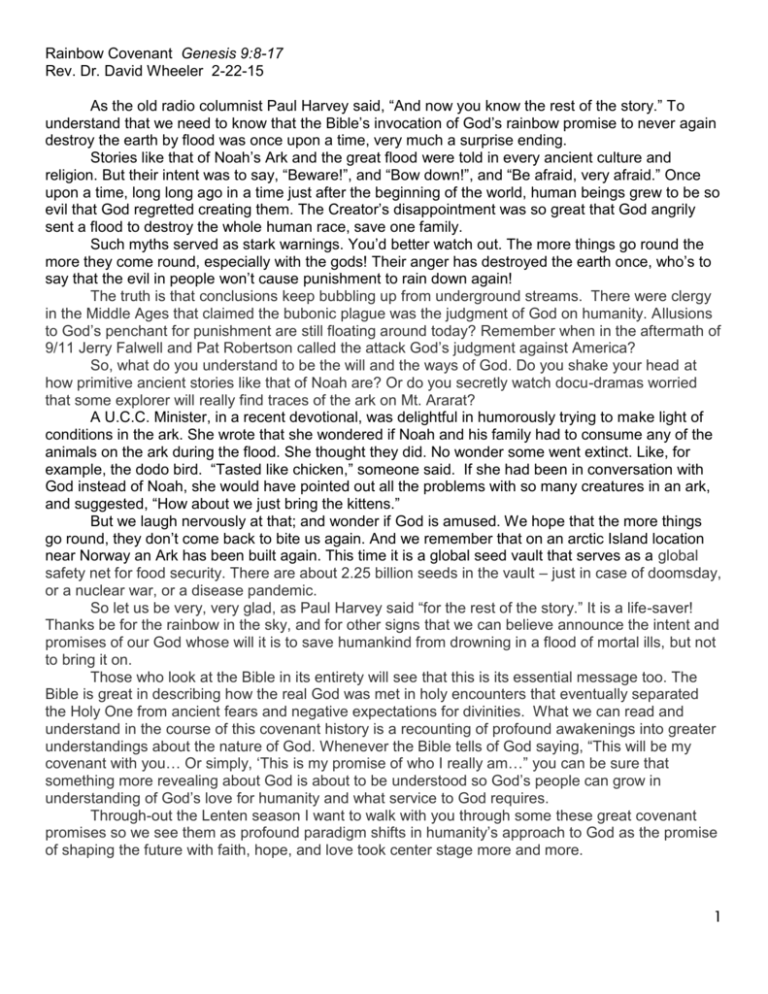
Rainbow Covenant Genesis 9:8-17 Rev. Dr. David Wheeler 2-22-15 As the old radio columnist Paul Harvey said, “And now you know the rest of the story.” To understand that we need to know that the Bible’s invocation of God’s rainbow promise to never again destroy the earth by flood was once upon a time, very much a surprise ending. Stories like that of Noah’s Ark and the great flood were told in every ancient culture and religion. But their intent was to say, “Beware!”, and “Bow down!”, and “Be afraid, very afraid.” Once upon a time, long long ago in a time just after the beginning of the world, human beings grew to be so evil that God regretted creating them. The Creator’s disappointment was so great that God angrily sent a flood to destroy the whole human race, save one family. Such myths served as stark warnings. You’d better watch out. The more things go round the more they come round, especially with the gods! Their anger has destroyed the earth once, who’s to say that the evil in people won’t cause punishment to rain down again! The truth is that conclusions keep bubbling up from underground streams. There were clergy in the Middle Ages that claimed the bubonic plague was the judgment of God on humanity. Allusions to God’s penchant for punishment are still floating around today? Remember when in the aftermath of 9/11 Jerry Falwell and Pat Robertson called the attack God’s judgment against America? So, what do you understand to be the will and the ways of God. Do you shake your head at how primitive ancient stories like that of Noah are? Or do you secretly watch docu-dramas worried that some explorer will really find traces of the ark on Mt. Ararat? A U.C.C. Minister, in a recent devotional, was delightful in humorously trying to make light of conditions in the ark. She wrote that she wondered if Noah and his family had to consume any of the animals on the ark during the flood. She thought they did. No wonder some went extinct. Like, for example, the dodo bird. “Tasted like chicken,” someone said. If she had been in conversation with God instead of Noah, she would have pointed out all the problems with so many creatures in an ark, and suggested, “How about we just bring the kittens.” But we laugh nervously at that; and wonder if God is amused. We hope that the more things go round, they don’t come back to bite us again. And we remember that on an arctic Island location near Norway an Ark has been built again. This time it is a global seed vault that serves as a global safety net for food security. There are about 2.25 billion seeds in the vault – just in case of doomsday, or a nuclear war, or a disease pandemic. So let us be very, very glad, as Paul Harvey said “for the rest of the story.” It is a life-saver! Thanks be for the rainbow in the sky, and for other signs that we can believe announce the intent and promises of our God whose will it is to save humankind from drowning in a flood of mortal ills, but not to bring it on. Those who look at the Bible in its entirety will see that this is its essential message too. The Bible is great in describing how the real God was met in holy encounters that eventually separated the Holy One from ancient fears and negative expectations for divinities. What we can read and understand in the course of this covenant history is a recounting of profound awakenings into greater understandings about the nature of God. Whenever the Bible tells of God saying, “This will be my covenant with you… Or simply, ‘This is my promise of who I really am…” you can be sure that something more revealing about God is about to be understood so God’s people can grow in understanding of God’s love for humanity and what service to God requires. Through-out the Lenten season I want to walk with you through some these great covenant promises so we see them as profound paradigm shifts in humanity’s approach to God as the promise of shaping the future with faith, hope, and love took center stage more and more. 1 It happened when God was revealed to Abraham and Sarah. Huge paradigm shifts took place when they realized that God would be with them wherever they went and that their destiny was to serve as God’s first family everywhere. It happened when God sent Moses to rescue the Hebrew slaves from Egyptian captivity and to guide them into being a nation, with the law of the 10 commandments. It happened when the people of Israel wanted kings to rule them like other nations, but God insisted on prioritizing their religion over their politics. It happened when the prophet Jeremiah realized that the real motivation to do what is right was nurtured in the inner self as love. It happened when Jesus lived this new covenant out with compassionate, merciful, healing love for an unforgiving world. The vision received by these men and women of faith lifted them above the conventional wisdom of their times and into a closer understanding and witness to the true nature of God sorely needed by the people of their day – and yet today, even ours. Today let’s talk about the Rainbow Covenant account pulled from the ancient past. Genesis is the first book in the Bible, and its title means, “Beginning” It starts with most far reaching memories about the time before time when the world was created. These memories were recalled in story form, and told over and over in oral culture to help people understand their place in the world and among the gods… In all of these ancient memories there are common themes, and one primary one was the problem of evil. How could it be explained? Where has it come from? Why was it so pervasive? The Biblical answers grew out of less hopeful beliefs that pervaded the ancient world. For example in one of most ancient accounts of creation from Babylonian mythology, the substance of the world came from the body parts of ancient warring gods, Formed out of their slaughter, therefore the earth is forever defiled. In that creation the Sabbath was not considered holy, it was terrifying. The rule was to stay inside, not resting, but keeping away of the angry gods roaming the earth that day. Because Babylon was the dominant culture, that was how divinity was understood, as angry, vindictive, punishing godhead. That is until the Hebrew people perceived a totally upside down vision of God and God’s world. When they wrote about creation they said, “And God looked at all God had made, and called it good.” When they spoke about the Sabbath it was for worshipping God: “Observe the Sabbath and keep it holy so that you may celebrate the goodness of God in your life and world.” Even when people fell victim to their own worst instincts, the real God would even redeem people should they fall victim to evil’s shadow. And they told an ancient story about a time before time when God had a chance to destroy the earth, but instead set the rainbow in the sky, and promised to restore the world. What a paradigm shift that was. And is. How profound it is to believe in the rest of the story. To take up the Bible and read at the beginning, “God created the world and saw that it was good.” And at the world’s crucial turning points God responded with new covenant promises of salvation and moral understanding. That’s the Bible’s story! And it’s not over. It is a never ending story. The Bulletin of Atomic Scientists keep what they call the Doomsday Clock to warn the world how close we are to war with atomic bombs. At the beginning of 2015 they moved it from five minutes to three minutes to midnight. Conditions in the world are that volatile. But is that all there is? Is it pie in the sky to hope that there is enough justice, goodness, and moral courage in the world to turn the clock back? If there are rainbows in the sky, God says there hope that can be stronger than fear. If you sent out a dove, from the stormy seas of life, you would find it, truly: I would offer, for example, the name of Malala Yousafzai an 18 year old woman, the youngest person ever to win the Nobel Peace Prize. She has worked since she was 12 years old for the rights of children and especially girls to receive an education in areas of Pakistan controlled by the Taliban. 2 Though she lived through an attempt on her life when she as 15, she has persevered. For the sake of the children. I would offer, for example a Pediatrician a member of one of the churches I’ve served, who was sick and tired of seeing hungry children in his practice. So he began to research ways to raise vegetable gardens to help feed them and found a method called “Square Foot Gardening” that uses small raised gardens and a special mixture of soils. He built two square foot gardens in his driveway and was excited with his bumper crop. Then he cajoled friends to build them and also used half his office parking lot for gardens. Two years ago he challenged the entire town to raise food for kids. He researched everything. He raised money. He got free lumber from Home Depot. His goal was 200 gardens. We thought he had delusions of grandeur. We were right, there were only 150 of the gardens growing that year. This year he wants the number doubled and has reduced his case load in order to give more time to gardening and providing health care screening for the sake of the poor. I would also offer, for example the 140 members of McFarland United Church of Christ, a UCC church in a small town of 8000 people close to Madison Wisconsin. The community of McFarland, this school year has suffered through the deaths of two high school students in auto accidents and the critical illness of a beloved coach. In the depths of winter, the congregation pondered if it could do anything to help. They have! Just two weeks ago they collected and purchased 400 yellow daffodils. On Thursday they delivered 380 of those daffodils to each teacher in the McFarland School District, for the sake of hope. As the old radio columnist Paul Harvey used to say, “And now you know the rest of the story.” Thanks be for those who act as rainbows in the sky, and for other signs that we can say repeat the promises of our God whose will it is to save humankind. 3



